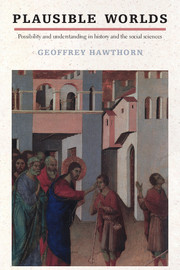1 - Counterfactuals, explanation and understanding
Published online by Cambridge University Press: 05 August 2012
Summary
It can be tempting to play what E. H. Carr called ‘parlour-games with might-have-beens’.
Granada was defeated in 1492. But suppose it had not been: suppose with Philip Guedalla that Boabdil had himself defeated Ferdinand and Isabella at Lanjarón a year before. In hindsight, ‘it was simply inconceivable’, as Grisley remarked in his Modern Europe, ‘that the rash adventure of the Catholic kings should have had any other ending’ than the one it did beneath the Sierra Nevada in 1491. Intelligent, resourceful, and organised, the Moors were bound to beat the still uneasily allied and overstretched forces of Aragon and Castile. The consequences, moreover, have been immense. (Others, including Edward Gibbon, have thought that if Charles Martel had not stopped the Moors near Poitiers in 732, they were consequences which might have been evident much earlier.) Grisley agreed with Sir William Creasy: Lanjarón had been one of the more decisive battles of the modern world.
The Cambridge History of Islam – actually a collection of essays prepared in the faculties at Granada and published under licence in Cambridge – deals at length with the alliances between Granada and the powers which in the sixteenth, seventeenth and eighteenth centuries, it played off against one another. Napier's History of the War in the Peninsula records the invaluable assistance that the king gave the British after Napoleon had rashly decreed in 1808 that the house of Boabdil had ceased to reign and that Pierre François Joseph Lefebvre, Duke of Dantzick, was henceforth to rule as Yussuf I.
- Type
- Chapter
- Information
- Plausible WorldsPossibility and Understanding in History and the Social Sciences, pp. 1 - 38Publisher: Cambridge University PressPrint publication year: 1991

